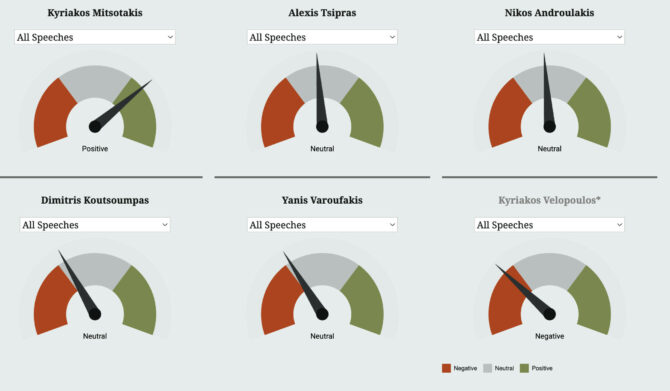The dual “silent” elections, proposed issues, and differentiated discourse on migration by political leaders
The extensive election period, commencing on April 22 and culminating in the New Democracy’s resounding victory on the evening of June 25, has drawn to a close. In order to conclude this period, we will examine the overarching discourse strategies employed by the leaders of parliamentary parties throughout this duration and we will explore the implications and potential research questions that can be gleaned from the analysis of the 170 speeches examined as part of the research project on the analysis of pre-election political discourse.
The “silent” elections were confirmed through the political discourse analysis
In our analysis, we aimed to examine the levels of polarization and populism in the discourse of political leaders during the election period. Initial expectations from politicians, commentators, and journalists suggested an anticipated rise in polarization and populism due to the successive elections. However, our findings did not confirm these assessments. We did not observe any strategy of extreme polarization or consistent use of polarizing language in the speeches of the political leaders. This conclusion aligns with the general perception of the elections being characterized as “silent” by many of us who experienced them. Nevertheless, it is important to note that there were occasional instances of polarization during both election periods. Notably, Dimitris Koutsoumpas recorded the highest escalation in the polarization index, with the KKE’s central slogan “them alone, and all of us” playing a significant role. On the other hand, populism was not a prominent discourse strategy employed by any political leader. While Alexis Tsipras’ speeches during the first election period contained some instances of populist language, they were relatively infrequent. In the second period, however, the use of populist rhetoric was nearly nonexistent. This finding, particularly regarding the second election period, raises questions about whether SYRIZA can still be classified as a populist party as it has been in the past. However, it is important to note that the presence or absence of populism in political discourse is not definitive, as it can manifest in varying degrees and at different moments.
Polarization and populism in the discourse of political leaders during the long election period
Kyriakos Mitsotakis consistently employs positive and programmatic discourse
Kyriakos Mitsotakis’ discourse demonstrates impressive consistency, characterized by a positive sentiment and a dedicated focus on promoting the party’s programmatic agenda. Throughout the election period, his speeches consistently maintained a predominantly positive tone, aligning closely with the programmatic goals of the party. This positive and programmatic dimension, which are closely intertwined, saw a slight increase in emphasis during the second election period, likely influenced by the positive outcome of the initial election. Regarding the other political leaders, Alexis Tsipras and Nikos Androulakis maintained a distinctively neutral sentiment in their speeches, whereas Dimitris Koutsoumpas and Yanis Varoufakis leaned more towards neutrality but occasionally displayed a negative sentiment. In contrast, Kyriakos Velopoulos consistently conveyed a negative sentiment in his speeches.
Sentiment analysis in the speech of political leaders during the second (left) and the first (right) election period
Mitsotakis’ criticism: economy in the first election period, immigration policy in the second
Regarding Kyriakos Mitsotakis’ areas of focus, it is worth noting that the trifecta of “economy-health-work” remained prominent throughout both election periods. This thematic agenda, championed by New Democracy, played a significant role in shaping the overall course of the extended election period. However, the specific areas of criticism underwent some variation: In the first election period, Mitsotakis primarily directed his criticism towards economic issues, emphasizing their importance and proposing solutions to address them effectively. In the second period, his attention shifted to the issue of immigration policy. The topic of migration was consistently presented as a matter of national security, often referencing the Evros fence. Criticism of SYRIZA’s immigration policy intensified, particularly after the tragic shipwreck off Pylos, leading Mitsotakis to defend his government’s strict approach. Finally, Mitsotakis made a deliberate choice to refrain from mentioning his political opponents by name. This approach continued in the second election period, with a further reduction in references to other politicians, to the extent that he became the primary focus of his own speeches.
Did the leaders focus on their agenda or criticism towards political opponents?
Kyriakos Mitsotakis’ discourse is characterized by a positive sentiment and a dedicated focus on promoting the party’s programmatic agenda. There was a conscious effort for Alexis Tsipras to place greater emphasis on the programmatic agenda in the second election period. Nikos Androulakis prioritized the programmatic dimension of his speech thoughout both election periods. Dimitris Koutsoumpas was balancing between the programmatic dimension and criticism.
Tsipras is moving away from populist rhetoric and focusing on the programmatic agenda in the second election period
In the second election period, Alexis Tsipras’ discourse underwent two notable changes compared to the first. Firstly, there was a significant reduction in populist speech patterns, with a near absence of such rhetoric. Secondly, there was a conscious effort to place greater emphasis on the programmatic agenda. In terms of the topics discussed, both election periods primarily revolved around the economy. However, in the second period, Tsipras also sought to highlight the importance of healthcare, which became a central focus of his criticism towards New Democracy. Additionally, he addressed issues of accountability, corruption, and democracy. On the other hand, certain important topics such as the environment, culture, energy, agricultural policy, infrastructure, national security, and migration received less attention or were ranked lower in priority.
Androulakis’ focus on agricultural policy in the first election period, transitioning to economy in the second
Nikos Androulakis, throughout both election periods, made a conscious choice to prioritize the programmatic dimension of his discourse rather than adopting a critical tone. His speeches displayed a multi-thematic and adaptable nature, tailored to the specific locations where they were delivered. Notably, in the first election period, Androulakis placed significant emphasis on agricultural policy – a move that resonated with farmers, as indicated by the exit poll data that ranked PASOK second in their vote choice. As the second election period unfolded, Androulakis’s discourse shifted its focus towards the economy, serving as both a pillar of his programmatic agenda and a subject of criticism. The issue of debt, encompassing both private and public debt, also held a prominent position in his speeches. Additionally, Androulakis strategically invoked the historical legacy of PASOK, leveraging it as a rhetorical tool. Andreas Papandreou emerged as the most frequently mentioned politician by the PASOK president, immediately following Mitsotakis and Tsipras.
Topic analysis in each leader’s speeches
Koutsoumpas highlighted immigration as a focal point in the second election period, while Velopoulos used it as a means of criticizing his opponents
Dimitris Koutsoumpas adopted a dual approach in his discourse, balancing between the programmatic dimension and criticism. In the second election period, there was a slight shift towards emphasizing his own positions. The economy and labor were prominent topics in both periods, but the first period also highlighted the issue of housing, which received less attention from other political leaders. In the second period, Koutsoumpas brought up the topic of migration, particularly following the shipwreck off Pylos, using it as a focal point.
When analyzing Kyriakos Velopoulos’ speeches, it is important to note that they differ from those of other leaders as they are primarily delivered in press conferences. Nonetheless, the leader of Greek Solution dedicated a significant portion of these statements to criticizing his opponents. In the first election period, his main themes were the economy and corruption, but in the second period, there was a shift towards the economy and immigration, the latter being utilized as a point of criticism against other parties.
As previously mentioned, the analysis of Yanis Varoufakis’ speeches solely encompasses the first election period, as it specifically examined the speeches of leaders from the most recent parliamentary parties at that time. During this period, Yanis Varoufakis notably prioritized the economy as a key topic and he expressed strong criticism towards the issues of debt and privatization.
Immigration in the election discourse of political leaders

How did political leaders address the issue of migration and refugees, if they addressed it at all, during the extended election period prior to the tragic shipwreck off the coast of Pylos?
The party leaders’ political discourse before 21 May

The political leaders’ speeches in the days leading up to the ballot box and the main conclusions we can draw about the political discourse employed during the just-ended election period.
The leaders’ stance on migration emerges as the main notable distinction in political discourse in the second election period
Excluding the dimensions of polarization and populism, which decreased even further in the second election period, the primary differentiation observed among political leaders was their stance on the migration issue. With the entry of two new parties (Spartans and Niki) into parliament after the June 25th election, it becomes relevant to examine how the absence of discourse on specific issues by political leaders relates to the presence of three parties positioned further to the right of New Democracy on the political spectrum. Such an analysis could delve into how these leaders addressed topics such as immigration, national security, and human rights, the latter of which systematically received very low attention.
In conclusion, the abundance of findings derived from this analysis holds the potential to stimulate further reflection, exploration, and the formulation of new research questions. The mentioned research questions are merely a subset of the possibilities that can be explored, fostering ongoing inquiry and investigation in this area.
Translation: Anatoli Stavroulopoulou
